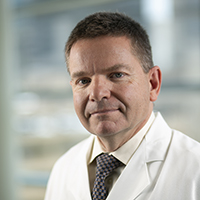
Alan Dackiw, M.D., Ph.D., M.B.A.
- Surgery - Endocrine Surgery
- Parathyroid & Thyroid Conditions
- Endocrine Surgery Treatments
New Patient Appointment Accepting Virtual Visits or 214-645-4673
Biography
Alan Dackiw, M.D., Ph.D., M.B.A., is a Professor in the Division of Endocrine Surgery in the Department of Surgery at UT Southwestern Medical Center. As a minimally invasive endocrine surgeon, he treats disorders of the thyroid, parathyroid, adrenal gland, and neuroendocrine pancreas.
His research involves the use of nerve monitoring, particularly intraoperative nerve monitoring, during thyroid and parathyroid surgery and the involvement of certain signaling pathways in the development of endocrine neoplasia as it relates to endocrine organ development.
After receiving his B.Sc. with honors from the University of Manitoba, Dr. Dackiw earned his medical degree and a B.Sc. in medicine at the University of Manitoba. He completed his residency in general surgery and Ph.D. at the University of Toronto and a surgical oncology fellowship at MD Anderson Cancer Center. He then completed an endocrine surgery fellowship at the University of California, San Francisco.
Dr. Dackiw was recruited to join the UT Southwestern faculty after serving on the surgical faculty at Johns Hopkins for 11 years.
He has performed more than 3,000 operations on the thyroid, parathyroid, adrenal glands, and pancreas, and has published extensively, in more than 150 articles, chapters, textbooks, and abstracts. He serves on the editorial board of a number of medical journals and is a member of many professional organizations, including the Society of Surgical Oncology, the International Association of Endocrine Surgeons, the American Association of Endocrine Surgeons, and the Endocrine Society.
Meet Dr. Dackiw
World-Renowned Expert in Endocrine Surgery and Surgical Oncology
One of a small, select group of physicians trained in both endocrine surgery and surgical oncology, Alan Dackiw, M.D., Ph.D. FACS, is at the forefront of innovations to treat malignant and benign disorders of the thyroid, parathyroid, adrenal glands, and endocrine pancreas. Dr. Dackiw has gained international recognition for his expertise in minimally invasive surgery for hyperparathyroidism and thyroid cancers, as well as other endocrine conditions.
He was among the first surgeons in the world to use highly advanced intraoperative nerve monitoring to protect the recurrent laryngeal nerve and the vocal nerves when operating in the neck. This technology provides immediate feedback and warning to surgeons during a procedure, before permanent nerve injury has occurred. The result is increased safety and improved outcomes – including protecting a patient’s vocal cords and ability to speak following complex surgeries such as those to remove tumors and nodules in the neck.
An experienced surgeon, Dr. Dackiw has performed more than 3,000 procedures. He’s helped patients with disorders ranging from Graves’ disease and Cushing syndrome to hyperparathyroidism and thyroid cancer.
“Minimally invasive procedures are one of the most important advancements in endocrine surgery for patients,” Dr. Dackiw says. “We’re able to be even more meticulous in removing tumors and treating exceptionally small areas in the neck or for removing adrenal tumors. The result is improved outcomes and more rapid recovery times.
“As an example, in the past, most adrenal operations required relatively large midline or subcostal incisions. But now, we can achieve excellent results using minimally invasive surgery, with incisions that are less than a couple of inches wide.”
Dr. Dackiw has received awards from the American Association of Endocrine Surgeons and the Maryland General Assembly and serves on several institutional and national educational and practice committees.
In addition, he has served on the editorial board of the Annals of Surgical Oncology, the most prestigious journal in his field. He also served as the editor for the Endocrine Surgery section of the American College of Surgeons Web portal and has served as editor for the Endocrine Tumor series in the journal Current Treatment Options in Oncology. Additionally, he has served on the Executive Council of the American Association of Endocrine Surgeons.
“I do the best technical operation that I can for every patient; however, I am also committed to being available and accessible to my patients and their families,” he says. “I try to make the whole surgical experience as easy as possible for them.”
Education & Training
- Other Post Graduate Training - University of Texas at Dallas (2015-2016)
- Other Post Graduate Training - University of Manitoba Max Rady College of Medicine (1989-1990)
- Other Post Graduate Training - University of Toronto, Canada (1993-1995)
- Medical School - University of Manitoba Max Rady College of Medicine (1986-1990)
- Graduate School - University of Manitoba Max Rady College of Medicine (1989-1990)
- Graduate School - University of Toronto, Canada (1993-1995)
- Residency - University of Toronto, Canada (1991-1998), Surgery
- Graduate School - University of Texas at Dallas (2015-2016)
- Internship - University of Manitoba (1990-1991), Surgery
- Fellowship - University of Texas MD Anderson Cancer Center (1998-2000), Surgical Oncology
- Fellowship - University of California San Francisco Medical Cen (2000-2001), Endocrine Surgery
Clinical Focus
- Parathyroid & Thyroid Conditions
- Endocrine Surgery Treatments
- Adrenal Conditions
- Neuroendocrine Pancreatic Disease
Q&A by Dr. Dackiw
Results: 1 Locations
Endocrine Cancer Clinic
at Cancer Care Outpatient Building 6202 Harry Hines Blvd., 7th FloorDallas, Texas 75235 214-645-4673 Directions to Endocrine Cancer Clinic at Cancer Care Outpatient Building, Dallas Parking Info for Endocrine Cancer Clinic
New Patient Appointment Accepting Virtual Visits or 214-645-4673

